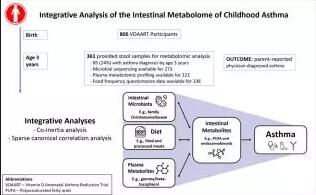JACI:儿童哮喘肠道代谢组学特征
发布日期:2019-04-04
①肠道代谢组学反映了各种暴露的生物学后果,并可能为哮喘的病理生理学研究提供线索。②在维生素D产前哮喘减轻试验(VDAART)的辅助研究中,对儿童哮喘的肠道代谢组学进行非靶向的综合分析。③采用质谱法对361例3岁儿童粪便样品进行代谢组学分析。调整后的logistic回归分析确定了3岁前与哮喘诊断高度相关的代谢物和代谢物模块。稀疏典型相关分析确定了肠道代谢组与其他“组学”之间与哮喘相关性:16S rRNA测序测定的肠道微生物组、质谱测定的血浆代谢组和食物频率问卷测定的饮食结构。3岁时,一些肠道代谢产物与哮喘相关,包括哮喘与多不饱和脂肪酸(校正后的logistic回归β值为-6.3,95% CI -11.3, -1.4, p = 0.01)和其他脂类之间的负相关。哮喘相关肠代谢物是婴儿出生前四个月纯母乳喂养与哮喘负相关关系(p为间接相关= 0.04)和富含肉类的饮食与哮喘正相关关系(p = 0.03)的重要中介物。特定的肠道细菌类群,包括Christensenellaceae族,和血浆代谢物,包括-生育酚/β -生育酚,与哮喘和哮喘相关的肠道代谢物呈正相关。④综合分析显示,肠道代谢组与肠道微生物组、血浆代谢组和饮食与儿童哮喘有关。这些发现需要在未来加以重复研究。

延伸阅读
JACI
[IF:13.1]
Integrative Analysis of the Intestinal Metabolome of Childhood Asthmahttps://doi.org/10.1016/j.jaci.2019.02.032
Abstract:
Background
The intestinal metabolome reflects biological consequences of diverse exposures and may provide insight into asthma pathophysiology.
Objective
To perform an untargeted integrative analysis of the intestinal metabolome of childhood asthma in this ancillary study of the Vitamin D Antenatal Asthma Reduction Trial (VDAART).
Methods
Metabolomic profiling was performed by mass spectrometry on fecal samples collected from 361 3-year-old subjects. Adjusted logistic regression analyses identified metabolites and modules of highly correlated metabolites associated with asthma diagnosis by age 3 years. Sparse canonical correlation analysis identified associations relevant to asthma between the intestinal metabolome and other “omics”: intestinal microbiome as measured by 16S rRNA sequencing, plasma metabolome as measured by mass spectrometry, and diet as measured by food frequency questionnaires.
Results
Several intestinal metabolites were associated with asthma at age 3 years, including inverse associations between asthma and polyunsaturated fatty acids (adjusted logistic regression beta = -6.3, 95% CI -11.3, -1.4, p = 0.01) and other lipids. Asthma-associated intestinal metabolites were significant mediators of the inverse relationship between exclusive breastfeeding for the first 4 months of life and asthma (p for indirect association = 0.04), and the positive association between a diet rich in meats and asthma (p = 0.03). Specific intestinal bacterial taxa, including family Christensenellaceae, and plasma metabolites, including gamma-tocopherol/beta-tocopherol, were positively associated with asthma and with asthma-associated intestinal metabolites.
Conclusion
Integrative analyses revealed significant interrelationships between the intestinal metabolome and the intestinal microbiome, plasma metabolome, and diet in association with childhood asthma. These findings require replication in future studies.
All Author:
Kathleen A.Lee-SarwarMD, MS12Rachel S.KellyPhD2JessicaLasky-SuScD2Robert S.ZeigerMD, PhD3George T.O’ConnorMD, MS4Megan T.SandelMD5Leonard B.BacharierMD6AvrahamBeigelmanMD, MSCI6NancyLaranjo2Diane R.GoldMD, MPH27Scott T.WeissMD, MS2 Augusto A.LitonjuaMD, MPH8
2019-3-27 Article
创建过敏性疾病的科研、科普知识交流平台,为过敏患者提供专业诊断、治疗、预防的共享平台。


开云电子(中国)官方网站 | 华亿首页(中国)网页版 | 开云网页版 | 天博手机网页(中国)有限公司 | 千亿体育线上平台中国有限公司 | 米兰手机在线登入 | 米乐官方网页版 | 华亿网页版 | 三亿体育首页(中国)网站首页 |
 华亿体育(中国)游戏平台
华亿体育(中国)游戏平台

